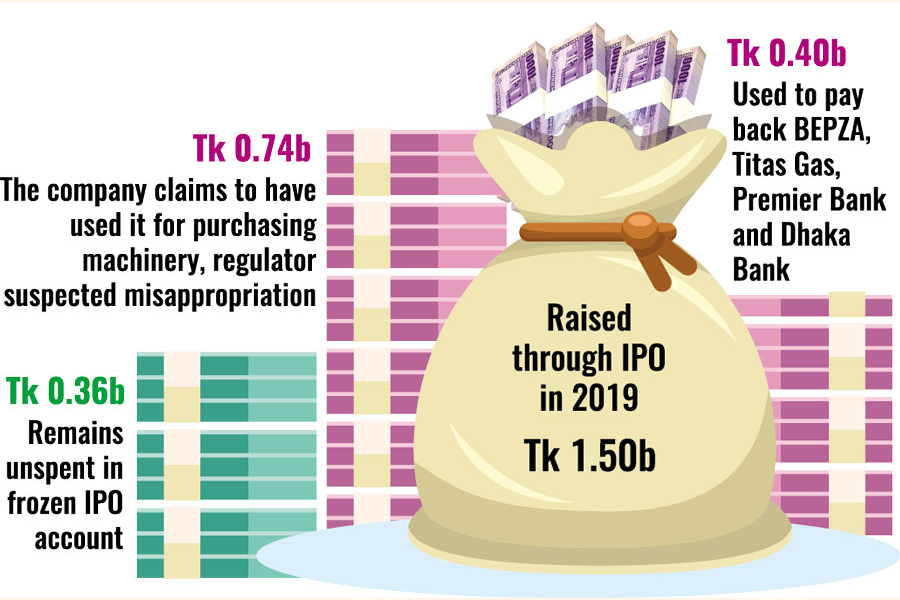Ring Shine Textiles to appeal to regulator to unfreeze IPO fund
The IPO fund was supposed to be utilized fully by August 2021

Published :
Updated :

The struggling Ring Shine Textiles obtained shareholders' consent to extend its IPO fund utilization time by one more year to December next year.
It had raised Tk 1.50 billion under the fixed price method in August 2019 but failed to use its initial public offering (IPO) proceeds although the deadline passed four years ago. Financial irregularities are to take the blame.
The IPO fund was supposed to be utilized fully by August 2021 in the acquisition of machinery & equipment and loan repayment.
However, the Bangladesh Securities and Exchange Commission (BSEC) froze its IPO accounts in January 2020, citing irregularities in fund expenses. By that time, a bigger chunk of the fund had allegedly been misappropriated. Only Tk 360 million remains untouched.
On receiving shareholders' approval, the new board of the company decided to apply for a time extension to the securities regulator, said Auniruddho Piaal, managing director of Ring Shine Textiles.
The board will also request the Bangladesh Securities and Exchange Commission (BSEC) to unfreeze the IPO account so that the money can be spent on purchasing machinery for business expansion.
"We plan to utilise the IPO fund to the best interest of our shareholders," said Mr Piaal.
Why is Ring Shine in trouble?
Ring Shine Textiles listed in December 2019.
Before the listing, the company increased its paid-up capital from Tk 99.50 million to Tk 2.85 billion by issuing pre-IPO shares, known as placement shares, to the then sponsors, directors, and 73 external local shareholders.
As many as 11 sponsor- directors and 33 external shareholders did not make any payment against their allotted shares. They sold out the pre-IPO shares, which they had got for free, after the listing and fled the country with the money.
The company's financial woes deepened as the Covid-19 broke out. It stumbled upon a lack of demand for its products from foreign buyers. The working capital shortfall, decline in orders, and raw material shortage led to the shutdown of its factory in September 2020.
The BSEC restructured its board in January 2021, appointing seven independent directors to observe the company's overall condition and make a plan on how to salvage the company out of its misery.
In June 2021, the factory went back into production partially under the newly-constructed board.
The company is still running with limited capacity as a significant portion of the company's machinery is not operational due to technical issues caused by delayed maintenance, according to its auditor.
The previous commission, led by Professor Shibli Rubayat-Ul Islam, allowed Wise Star Textile Mills and five other Singapore-based firms to take over Ring Shine, but the deal was finally cancelled as the terms set by the regulator were not met.
Enquiry committee formed
Meanwhile, on November 19 this year, the new commission formed an inspection committee to examine the premises of Ring Shine's factory, its head offices, books of accounts, records, and other relevant documents.
The three-member committee was asked to submit a report within 30 working days.
The committee will assess the utilisation of IPO proceeds in accordance with the consent letter and prospectus, identify the transactional parties, evaluate the cash flow of transactions and the fairness of those investments, and verify bank transactions and other related issues.
Business Performance
Ring Shine Textiles has reported a loss of Tk 396 million for the July-September quarter this year despite higher revenue.
Its revenue grew 137 per cent year-on-year to Tk 645 million in July-September, while the cost of production jumped 55 per cent to Tk 761 million in the quarter, compared to the same quarter a year ago.
The loss was primarily due to challenges in securing essential raw materials amid difficulties in opening letters of credit (LCs).
In the meantime, the managing director claimed that the company started getting an increasing number of orders from buyers.
The company has been incurring losses for more than four years. Between FY21 and FY24, it incurred an aggregate loss of Tk 4.45 billion.
It distributed a 15 per cent stock dividend for the listing year, helping the fraudsters to extract more money from the market.
Stock Performance
The stock tumbled 59 per cent after the regulator lifted the floor price. It closed at Tk 4 per share on Thursday, losing 2.44 per cent from the day before.
The stock market regulator transferred the stock to 'Z' category on February 18 this year as the company had failed to declare dividends since 2019.
bulfexpress@gmail.com


 For all latest news, follow The Financial Express Google News channel.
For all latest news, follow The Financial Express Google News channel.